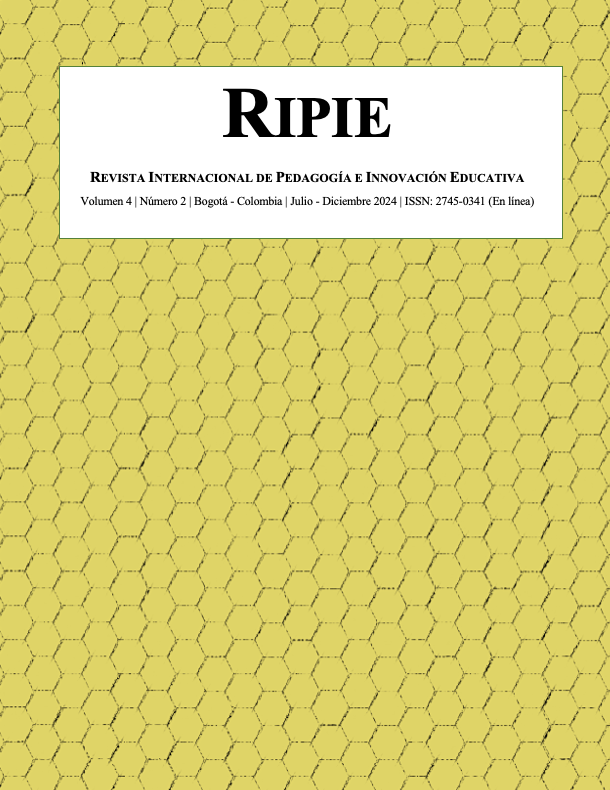Artificial Intelligence: some considerations in the educational field from a teacher's perspective
DOI:
https://doi.org/10.51660/ripie42216Keywords:
inteligencia artificial, desafíos, beneficios, educaciónAbstract
The development of new technologies has provided the opportunity to improve the teaching of educational systems, however, they should not be a substitute for accompanying teachers in the training of students. For this reason, the aim of this paper was to describe the educational challenges related to the evolution of artificial intelligence from a teacher's perspective. The study is approached from a qualitative approach, using a basic aspect of grounded theory, which seeks to unveil the theory from the data, on the reality of study, the scope is descriptive, the data is collected through a structured interview with 20 teachers, two open questions and one multiple choice question were considered, whose results show ChatGPT and Google Classroom as the most used AI tools, the ease of use, time savings and the development of teaching material as its benefits, among the limitations it is noted that if AI is not used as a tool for a solid academic training it can limit the application of critical thinking in students. Therefore, the study provides information to support teachers in improving their practice, since there are more and more platforms that can be explored and applied, especially those that facilitate ethical text writing. Therefore, by way of conclusion, it is possible to mention that some considerations give us a combination of critical reflection, collaboration, training and adequate regulation is feasible to make the best use of artificial intelligence to optimize education and prepare future generations for an increasingly technological and complex world.
Downloads
References
Albarrán, F., & Díaz, C. (2021). Metodologías de aprendizaje basado en problemas, proyectos y estudio de casos en el pensamiento crítico de estudiantes universitarios. Revista de Ciencias Médicas de Pinar del Río, 25(3), 10.
Ayuso del Puerto, D., & Gutiérrez Esteban, P. (2022). La Inteligencia Artificial como recurso educativo durante la formación inicial del profesorado. RIED-Revista Iberoamericana de Educación a Distancia, 25(2). https://doi.org/10.5944/ried.25.2.32332
Córica, J. L. (2020). Resistencia docente al cambio: Caracterización y estrategias para un problema no resuelto. RIED. Revista Iberoamericana de Educación a Distancia, 23(2), 255-272.
IMCO. (2023). Inteligencia Artificial: El futuro de la Educación en México. https://imco.org.mx/wp-content/uploads/2023/06/ElFuturoDeLaEducacion_Reporte_20230614.pdf
Moreno Padilla, R. D. (2023). INTELIGENCIA ARTIFICIAL EN LA EDUCACIÓN. Revista Digital de Tecnologías Informáticas y Sistemas, 7(1), 100–106. https://doi.org/10.36825/RITI.07.14.022
Nohlen, D. (2003). El Método comparativo. www.rzuser.uni-heidelberg.de.
OCDE. (2020). Making the Most of Technology for Learning and Training in Latin America. https://doi.org/10.1787/ce2b1a62-en
OECD. (2019). Artificial Intelligence in Society. París: OECD Publishing.
OTecH. (2019). ¿Qué es la inteligencia artificial? Observatorio Tecnológico de Hidalgo. https://otech.uaeh.edu.mx/noti/index.php/ia/que-es-la-inteligencia-artificial-2/
Rivas, A., Buchbinder, N., & Barrenechea, I. (2023). El futuro de la Inteligencia Artificial en educación en América Latina. OEI.
Rodríguez, F. J. (2023). El Papel de la Inteligencia Artificial en la brecha educativa y digital en México. https://www.uag.mx/es/mediaHub/el-papel-de-la-inteligencia-artificial-en-la-brecha-educativa-y-digital-en-mexico/2023-08
Sanglier, G. (2021). Qué es el ‘pensamiento visible’ y cómo se puede aplicar en el aula. (A. País, Ed.) El Mostrador, pág. 5.
Tejero-González, J. M. (2021). Técnicas de investigación cualitativa en los ámbitos sanitario y sociosanitario. Ediciones de la Universidad de Castilla-La Mancha. https://rediie.cl/wp-content/uploads/Te%CC%81cnicas-deinvestigacio%CC%81n-WEB-4.pdf
Unesco. (2023). Resumen del Informe de seguimiento de la educación en el mundo 2023: Tecnología en la educación: ¿Una herramienta en los términos de quién? París, Unesco.
Zini, A. (2023). Digital Skills & Jobs Platform. Finlandia: IA, innovación política y futuro del trabajo y el aprendizaje. https://digital-skills-jobs.europa.eu/en/inspiration/research/finland-ai-policy-innovation-and-future-work-and-learning-2022
Zini, A. (2023). Digital Skills & Jobs Platform. Finlandia: IA, innovación política y futuro del trabajo y el aprendizaje. https://digital-skills-jobs.europa.eu/en/inspiration/research/finland-ai-policy-innovation-and-future-work-and-learning-2022
Downloads
Published
Issue
Section
License
Copyright (c) 2024 Revista Internacional de Pedagogía e Innovación Educativa

This work is licensed under a Creative Commons Attribution-NonCommercial-ShareAlike 4.0 International License.
Articles are published under the terms of a licence that permits use, distribution and reproduction in any medium, provided that the original work is properly cited. Ed&TIC retains the proprietary rights to the published works and actively promotes the reuse of these works under the terms of the aforementioned licence, which encourages the dissemination of knowledge and collaboration in the academic community.


